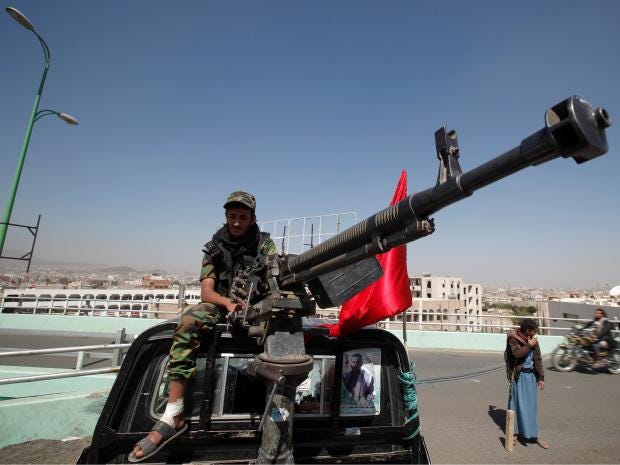Saudi/Iranian Scapegoats
"What's missing? Everything!"
"We lack medical staff, nurses and medicine."
Manal al-Ariqi, doctor, pediatric hospital, Sana'a, Yemen
"They have hit many factories on the basis of suspicion, but we never get the real reasons."
"Any institution that has a big hangar [goods warehouse], they hit it directly."
Abdul-Hakeem Al Manj, lawyer, Sana'a Chamber of Commerce and Industry
"We're not talking about something useless [bombing of production facilities for domestic goods and products for export]."
"We're talking about infrastructure and people's lives. Strikes like this can bring a family to the ground."
Abdullah Alsonidar, family factory owner, Yemen

Plant workers sifting through the debris of the factory where they once earned their living, find munitions remnants. Among the objects found pieces of a CBU-105 cluster bomb unit. The kind that contains ten high-explosive submunitions to deadly effect. Yemenis, it seems, often discover among the remains of strikes carried out by Saudi pilots, bits of U.S.-produced munitions. Those tell-tale munitions parts were found at a strike on a funeral that had killed 100 mourners last month.
For the past nineteen months Saudi Arabia has led a mostly Gulf State coalition, bombing Yemen in a proxy war against Iranian-supported Shiites known as Houthis who took control of Sana'a in 2014, forcing the country's western- and Sunni-backed president, Abdu Rabbu Mansour Hadi into exile. Indiscriminate bombing always disadvantages civilians who become the massive victims in any such conflict.
 |
| A Houthi militant sits atop a police patrol truck stationed on a bridge in the capital Sanaa Khaled Abdullah/Reuters |
While aiming and claiming to target Houthi strongholds, hospitals and schools, bridges, power stations, poultry farms, seaports and factories producing yogurt, tea, tissues, ceramics and potato chips have all been hit, along with wedding parties and funeral processions. The bombing campaign has resulted in a humanitarian crisis in the poorest country in the Arab world. They might well declare with respect to the Islamic Republic of Iran and the Kingdom of Saudi Arabia: "A plague on both their houses".
Where severe deprivation and scarcity of food, potable water, medicine and the total collapse of all aspects of civil infrastructure exists, there disease makes inroads. Cholera is on the spread. Millions struggle to find food. Malnourished infants overwhelm hospitals, according to the United Nations. Pilots trained by the United States carry out strikes on behalf of their Saudi nation.
"The economic dimension of this war has become a tactic. It is all consistent -- the port, the bridges, the factories", commented Jamie McGoldrick, the humanitarian coordinator for Yemen through the United Nations. And tellingly, spray-painted across the city can be seen the rallying cry of the Houthis: "God is great", "Death to America", "Death to Israel", "Curse on the Jews", "Victory for Islam". A chip in good standing off the malevolent Iranian block.
The World Food Program warns that 14.4 million of the 26 million people of Yemen have insufficient food, and they are suffering horribly. Northwest of the capital held by the Houthis, thousands of families have constructed shelters from canvas, plastic sheeting and mud bricks. Charitable donations fill in the gaps necessary to keep them alive. Rice and bread are cooked on mud stoves fuelled with wood or with garbage.
"The glorious and sublime nation of Iran will continue to support the resistance of Muslim nations, especially the innocent people of Yemen, against the Zionist wrongdoing of House of Saud and calls all divisions of the Islamic nation to condemn the great and brutal crime in Sana and unveil the face of hypocrites who claim to be servants of the holy shrines [Mecca and Medina]."
Islamic Revolutionary Guards Corps of Iran statement

<< Home